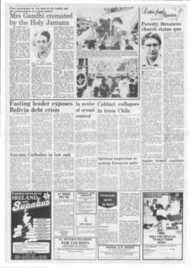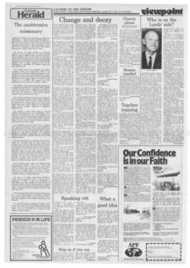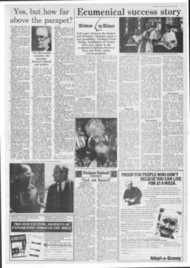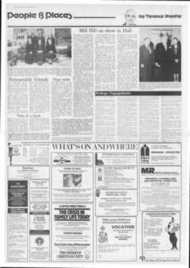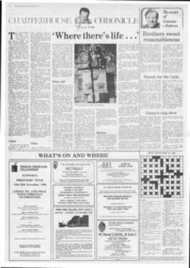Page 1, 9th November 1984
Page 1

Report an error
Noticed an error on this page?If you've noticed an error in this article please click here to report it.
Tags
Share
Related articles
Curia Head Calls Liberation Theology 'error'
Liberation Theology In Focus Again
Ratzinger Puts On Show Of Force
Reporting On The ‘doctrinal Enforcer’
Secular Europe Is The Enemy, Says Ratzinger
Cardinal attacks liberal church
by Desmond O'(rads in Rome A STRONG call for a return to pre-Vatican 11 values came this week from Cardinal Joseph Ratzinger, one of the most influential voices in the Curia.
Cardinal Ratzinger, Prefect of the Vatican's Doctrinal Congregation, considers that after the Vatican Council many Catholics lost the sense of the faith. He said "there was an indiscriminate opening" to an atheistic and agnostic world which was interpreted too positively.
The German Cardinal, who heads the Vatican office responsible for policing Catholic orthodoxy, made his comments in an interview to the Italian Catholic monthly Jesus published by the San Paolo religious order. It is the most outspoken enunciation of a conservative programme to have come from a leading Vatican official.
Cardinal Ratzinger grabbed attention recently for his criticism of the "theology of liberation" but his attempts to curb it have been less than successful. In his interview, he returned to the attack: "It is impossible to dialogue with theologians who accept the illusory myth that class struggle is an instrument for the creation of a classless society. This myth blocks reforms and aggravates misery and injustice."
He was trenchant on the bankrupt messianism of eastern Europe. He said that in East Europe dialogue does not expose Christians to dangers because daily the failure of "human messianism" is evident. "Only where Marxism is not in power are there still some who believe in its false 'scientific truths' . . . because of its philosophic development and its moral aims, Marxism seems to me a deeper temptation than superficial atheism."
Ratzinger criticised East Europe but did not praise the West: "There is something diabolic in the way the drug and pornographic markets are exploited. A culture which persuades people that the only aim of life is private interests and pleasure in infernal."
Some United States theologians, according to Ratzinger, have fallen down on their task of persuading people to resist this infernal culture: "Many (US) moral theologians believe they have to choose between clashing with the society or with the bishops. Many chose the latter course, agreeing to compromise with a secular ethic.
The Cardinal, instead, considered that Christians must make their contrasts with the secular ethic clear for all.
Perhaps the most controversial part of Cardinal Ratzinger's interview regards episcopal conferences which acquired great prestige in the wake of the Vatican Council
Ratzinger said that after the social unrest of 1968 it was realised that bishops were needed who could be open to the world, but would also oppose its negative tendencies. "It is necessary to restore power to the bishops in their diocese", said the former Archbishop of Munich, "and liberate them from the too bureaucratic structures of episcopal conferences. Bishops have a theological status but not the episcopal conferences which are only practical arrangements. It is necessary to keep this in mind. In many episcopal conferences the somewhat passive majority accept the position of enterprising minorities because of group spirit, perhaps because the wish of for a quiet life or even conformism."
blog comments powered by Disqus



